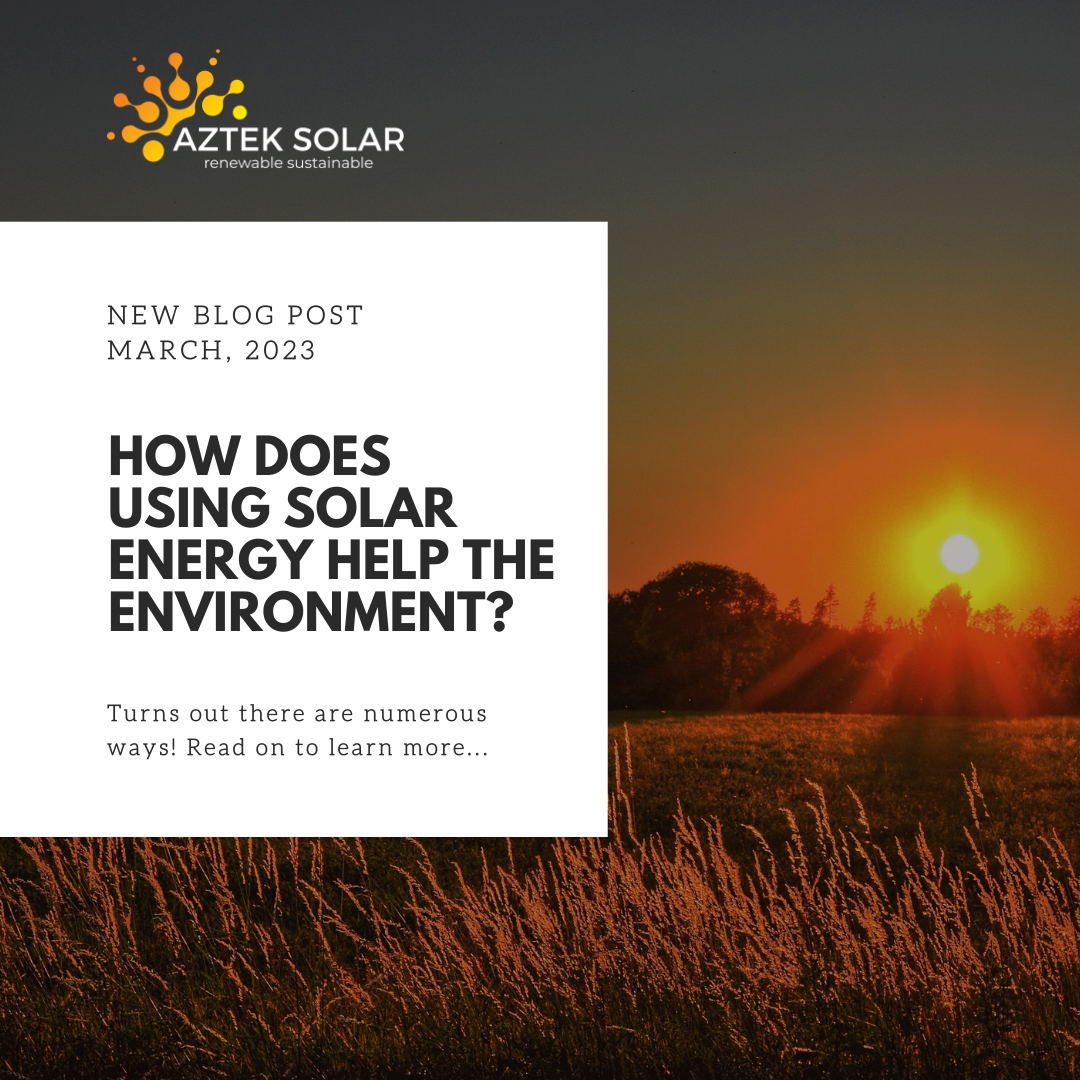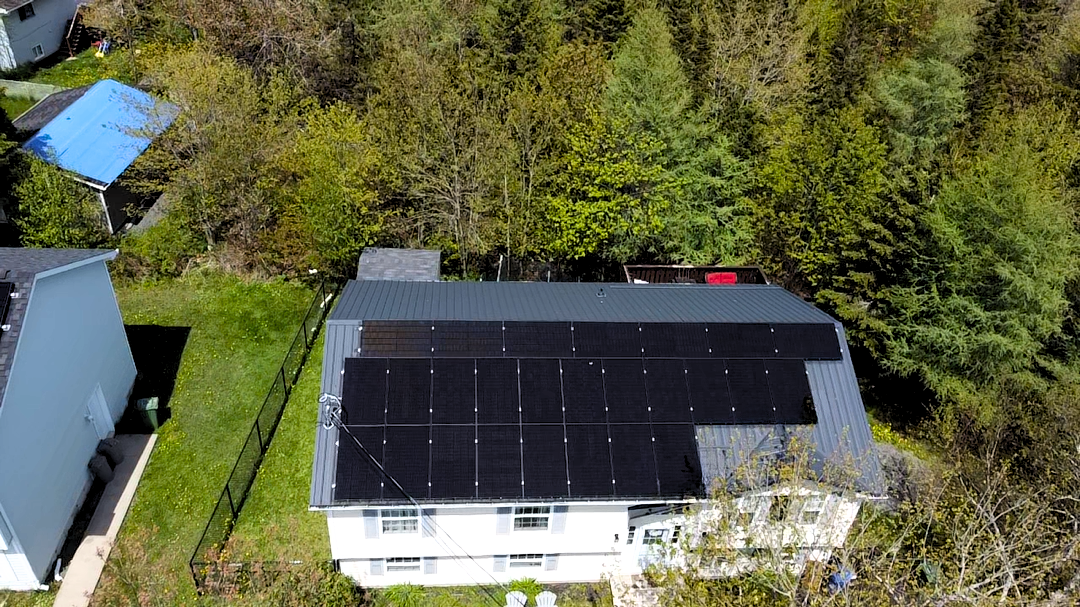BLOG
Solar energy advice you can count on.
Brian McKay
President, Aztek Solar Ltd
#SolarIsNow #RenewableEnergy #AztekSolar
Aztek Solar is a leading direct installer for a variety of solar systems. We are deeply committed to client service excellence and have created the
Solar Energy Advice Blog to provide insight into solar energy options. Helping you make informed decisions about solar power as a renewable energy resource is part of our commitment to you.
Solar Literacy

When it comes to generating clean, sustainable energy, the versatility of solar panels is often underestimated. The common misconception is that solar panels only thrive in ideal, sunny conditions. However, the truth is that they exhibit remarkable resilience, enduring through sun, snow, or sleet. In this article, we'll explore the steadfast nature of solar panels in various weather conditions and highlight the substantial benefits they bring, including significant savings on monthly electricity bills and a positive environmental impact.

Winter in Nova Scotia often brings to mind visions of snow-covered landscapes and cozy evenings by the fire. While the season may be chilly, it's also an opportune time to explore the incredible benefits of harnessing solar power. Contrary to common misconceptions, solar panels don't hibernate during the winter months. In fact, they continue to generate clean, sustainable energy, offering homeowners and business owners a unique chance to turn snowflakes into savings.

As the push for sustainable and eco-friendly practices gains momentum worldwide, businesses in Atlantic Canada are increasingly exploring innovative ways to reduce their carbon footprint and lower energy costs. One such avenue that is gaining popularity is solar energy. In this blog post, we will explore how your business in Atlantic Canada can harness the abundant solar energy resources in the region and take advantage of the many benefits that solar power offers.

In a world that is increasingly embracing sustainable living and environmentally conscious choices, solar energy has emerged as a powerful solution. Not only does it reduce your carbon footprint, but it also saves you money in the long run. Solar panels, when harnessed effectively, can be a game-changer for both residential and commercial spaces. If you're considering making the switch to solar energy, you're in the right place! Aztek Solar is here to guide you through some creative and innovative solar panel installation ideas that can elevate your energy game.

As renewable energy gains momentum across the world, many homeowners in Atlantic Canada are increasingly turning to solar power to harness the region's abundant sunlight. Going solar not only helps reduce electricity bills but also contributes to a greener environment. However, when it comes to installing solar panels, homeowners are often faced with a crucial decision: hire a professional solar panel installer or take the do-it-yourself (DIY) route. This blog post will delve into the pros and cons of each option, allowing you to make an informed decision that best suits your needs and circumstances in Atlantic Canada.

As the world strives to transition to cleaner and more sustainable energy sources, solar power has emerged as a promising solution. The region of Atlantic Canada, blessed with ample sunlight and a growing interest in renewable energy, is witnessing a surge in solar installations. However, solar energy storage has become a crucial question for homeowners and businesses alike. Should one store solar energy for personal use or opt to pump it into the grid? In this article, we'll explore the advantages and disadvantages of both options to help you make an informed decision.

The world is at a critical juncture, facing multiple challenges such as climate change, rising energy demands, and the depletion of finite fossil fuel resources. In such a scenario, solar energy emerges as a beacon of hope and a key solution to address these pressing issues. Solar power offers numerous benefits, making it a vital part of our energy mix both now and in the future. In this blog post, we will delve into the reasons why solar energy is important and how it can shape a sustainable future.

Renewable energy has become increasingly popular in recent years as concerns about climate change and environmental damage have grown. Solar energy is one of the most promising sources of renewable energy, with solar panels becoming more affordable and accessible to consumers. In this blog post, we will discuss how renewable solar energy is produced and the benefits it offers.

Solar energy is a clean, sustainable, and renewable source of energy that is becoming increasingly popular in Atlantic Canada. Harnessing the power of the sun to generate electricity for your home is an excellent way to reduce your carbon footprint, lower your energy bills, and contribute to a healthier planet.
Total Home Solar PV

In a world that is increasingly embracing sustainable living and environmentally conscious choices, solar energy has emerged as a powerful solution. Not only does it reduce your carbon footprint, but it also saves you money in the long run. Solar panels, when harnessed effectively, can be a game-changer for both residential and commercial spaces. If you're considering making the switch to solar energy, you're in the right place! Aztek Solar is here to guide you through some creative and innovative solar panel installation ideas that can elevate your energy game.

As renewable energy gains momentum across the world, many homeowners in Atlantic Canada are increasingly turning to solar power to harness the region's abundant sunlight. Going solar not only helps reduce electricity bills but also contributes to a greener environment. However, when it comes to installing solar panels, homeowners are often faced with a crucial decision: hire a professional solar panel installer or take the do-it-yourself (DIY) route. This blog post will delve into the pros and cons of each option, allowing you to make an informed decision that best suits your needs and circumstances in Atlantic Canada.

As the world strives to transition to cleaner and more sustainable energy sources, solar power has emerged as a promising solution. The region of Atlantic Canada, blessed with ample sunlight and a growing interest in renewable energy, is witnessing a surge in solar installations. However, solar energy storage has become a crucial question for homeowners and businesses alike. Should one store solar energy for personal use or opt to pump it into the grid? In this article, we'll explore the advantages and disadvantages of both options to help you make an informed decision.

Solar energy is a clean, sustainable, and renewable source of energy that is becoming increasingly popular in Atlantic Canada. Harnessing the power of the sun to generate electricity for your home is an excellent way to reduce your carbon footprint, lower your energy bills, and contribute to a healthier planet.

As green energy becomes more popular, the demand for domestic solutions that exploit renewables keeps growing. For that reason, many alternatives are now available to homeowners who want to reduce their carbon footprint and save on their energy bills. If your choice of energy source happens to be the sun, you might already know that two systems are available today: solar panels and solar water heaters. While they both work by absorbing sunlight - and thus need to be placed on your roof, their similarities end there. In fact, they are two very different products .Let’s have a closer look at these two technologies Solar Hot Water Solar water heating technology uses the heat from the sun to heat water. Solar water heating systems capture heat from sunlight via a solar thermal collector – a low-profile box similar to a solar photovoltaic panel that sits on your building’s roof or in an open area that receives ample sunlight .Small tubes that allow water to flow through the collector are inside the thin box. The collector is deliberately made using black materials to collect as much heat from sunlight as possible .As water passes through the small tubes inside the solar thermal collector, it collects heat, increasing the temperature of the water inside the storage tank. This water can be used for showers, baths, heating a swimming pool, or even underfloor heating Solar PV Instead of only offering solar water heating, solar photovoltaic panels provide an eco-friendly, cost-effective and efficient source of electricity. Solar panels produce electricity by converting sunlight into a direct current (DC) which passes into an inverter. The inverter converts this DC electricity into usable electricity for your home or commercial building. Solar PV Vs. Solar Hot Water: Which is Better? Solar PV panels offer a number of advantages beyond solar water heating. Due to their simpler design – solar photovoltaic panels have no moving parts – they need little long-term maintenance. Solar water heating is a temperamental thing. Water weighs a lot, it expands when it freezes, and it can cause scaling damage to pipes when it boils. Solar thermal systems are wonderfully efficient, and some systems work just fine for decades, but even these need regular inspection. When a solar thermal system fails, however, it sets about destroying itself, and it has been clear for some time that solar thermal water heating is not the way of the future except for very low-end heat usage, like swimming pools. Technically, solar water heaters use sunlight more efficiently than photovoltaic systems, partly because of the complex series of interactions that happen in the photovoltaic panel. In addition, the silicon used in photovoltaic systems can’t use as many wavelengths of light as the water heater, so some light goes to waste. Technicalities aside, however, photovoltaic systems are the better choice for the vast majority of consumers and the environment. That’s because some energy used to heat the water goes to waste as it cools off in your basement. Photovoltaic systems, on the other hand, don’t waste surplus energy. Electricity demand peaks at different times depending on the time of year and local weather. But, for the most part, we put the most stress on the grid when the sun is up and producing kilowatt hours, especially in the summer. And even if your roof panels produce more energy than you can use, the surplus feeds back into the grid, displacing energy that would have been produced by coal, gas, or nuclear plants. (Your electric supply is a two-way street. Just like the power company can push electrons into your home, you can push them back out.) In other words, a rooftop photovoltaic system can spread its benefit across the entire energy grid. Solar water heaters help only a single household. Final Verdict A PV System and a Solar Thermal System are both fantastic renewable energy choices that also have economic benefits, but if your heat and water bills are higher in our Canadian winters and you would also like to turn your electricity bill into a possible source of income, then the likely choice would be a solar PV system.

The earth is getting warmer at an alarming pace. Scientists have been ringing the alarm bell for quite some time, but we have only started paying attention recently when across the globe we have seen the adverse effects of climate change. Climate change refers to long-term shifts in temperatures and weather patterns. These shifts may be natural, but since the 1800s, human activities have been the main driver of climate change, primarily due to the burning of fossil fuels (like coal, oil and gas), which produces heat-trapping gases. In this mix, solar energy may just hold the key to solving our planet’s most critical problem! How? That’s because it’s one of the cleanest sources of energy out there. Let’s take a deep dive into what clean energy actually is and whether solar energy is actually clean. What is Clean Energy? Clean energy works by producing power without having negative environmental impacts, such as the release of greenhouse gases like carbon dioxide. Clean energy is energy gained from sources that do not release air pollutants, while green energy is energy derived from natural sources. There is a subtle difference between these two energy types even though they are often spoken of as being the same. Renewable energy, often referred to as clean energy, comes from natural sources or processes that are constantly replenished. For example, sunlight and wind keep shining and blowing, even if their availability depends on time and weather. These renewable energy resources won’t run out, unlike fossil fuels and gas. While renewable energy is often thought of as a new technology, harnessing nature’s power has long been used for heating, transportation, lighting, and more. Wind has powered boats to sail the seas and windmills to grind grain. The sun has provided warmth during the day and helped kindle fires to last into the evening. But over the past 500 years or so, humans increasingly turned to cheaper, dirtier energy sources, such as coal and fracked gas. Now that we have innovative and less-expensive ways to capture and retain wind and solar energy, renewables are becoming a more important power source. The perfect clean energy mix occurs where green energy meets renewable energy, such as with solar energy and wind energy. So we can easily say that solar energy is not only “clean”, it is also a form of renewable and green energy. Why is Clean Energy Important? For many decades, fossil fuels such as coal, oil or gas have been major sources of electricity production, but burning carbon fuels produces large amounts of greenhouse gases which cause climate change and have harmful impacts on people’s well-being and the environment. This affects everyone, not just a few. Is Solar Energy a Clean Source of Energy? Humans have been harnessing solar energy for thousands of years—to grow crops, stay warm, and dry foods. Today, we use the sun’s rays in many ways—to heat homes and businesses, to warm water, and to power devices. Solar power is the key to a clean energy future. Every day, the sun gives off far more energy than we need to power everything on earth. No greenhouse gas emissions are released into the atmosphere when you use solar panels to create electricity. And because the sun provides more energy than we’ll ever need, electricity from solar power is a very important energy source in the move to clean energy production. Using solar energy can have a positive, indirect effect on the environment when solar energy replaces or reduces the use of other energy sources that have larger effects on the environment. Moreover, the environmental impact of solar power is significantly smaller than other power generation methods. The impact is mainly related to the production and supply of the special materials and metals that are required to produce solar panels. That’s pretty much it! We hope that by now you will have a fairly reasonable understanding of why solar power is not just a clean source of energy, but also the best way forward in saving our planet from the harm we have brought upon it!
Solar Pools & Hot Tubs

As green energy becomes more popular, the demand for domestic solutions that exploit renewables keeps growing. For that reason, many alternatives are now available to homeowners who want to reduce their carbon footprint and save on their energy bills. If your choice of energy source happens to be the sun, you might already know that two systems are available today: solar panels and solar water heaters. While they both work by absorbing sunlight - and thus need to be placed on your roof, their similarities end there. In fact, they are two very different products .Let’s have a closer look at these two technologies Solar Hot Water Solar water heating technology uses the heat from the sun to heat water. Solar water heating systems capture heat from sunlight via a solar thermal collector – a low-profile box similar to a solar photovoltaic panel that sits on your building’s roof or in an open area that receives ample sunlight .Small tubes that allow water to flow through the collector are inside the thin box. The collector is deliberately made using black materials to collect as much heat from sunlight as possible .As water passes through the small tubes inside the solar thermal collector, it collects heat, increasing the temperature of the water inside the storage tank. This water can be used for showers, baths, heating a swimming pool, or even underfloor heating Solar PV Instead of only offering solar water heating, solar photovoltaic panels provide an eco-friendly, cost-effective and efficient source of electricity. Solar panels produce electricity by converting sunlight into a direct current (DC) which passes into an inverter. The inverter converts this DC electricity into usable electricity for your home or commercial building. Solar PV Vs. Solar Hot Water: Which is Better? Solar PV panels offer a number of advantages beyond solar water heating. Due to their simpler design – solar photovoltaic panels have no moving parts – they need little long-term maintenance. Solar water heating is a temperamental thing. Water weighs a lot, it expands when it freezes, and it can cause scaling damage to pipes when it boils. Solar thermal systems are wonderfully efficient, and some systems work just fine for decades, but even these need regular inspection. When a solar thermal system fails, however, it sets about destroying itself, and it has been clear for some time that solar thermal water heating is not the way of the future except for very low-end heat usage, like swimming pools. Technically, solar water heaters use sunlight more efficiently than photovoltaic systems, partly because of the complex series of interactions that happen in the photovoltaic panel. In addition, the silicon used in photovoltaic systems can’t use as many wavelengths of light as the water heater, so some light goes to waste. Technicalities aside, however, photovoltaic systems are the better choice for the vast majority of consumers and the environment. That’s because some energy used to heat the water goes to waste as it cools off in your basement. Photovoltaic systems, on the other hand, don’t waste surplus energy. Electricity demand peaks at different times depending on the time of year and local weather. But, for the most part, we put the most stress on the grid when the sun is up and producing kilowatt hours, especially in the summer. And even if your roof panels produce more energy than you can use, the surplus feeds back into the grid, displacing energy that would have been produced by coal, gas, or nuclear plants. (Your electric supply is a two-way street. Just like the power company can push electrons into your home, you can push them back out.) In other words, a rooftop photovoltaic system can spread its benefit across the entire energy grid. Solar water heaters help only a single household. Final Verdict A PV System and a Solar Thermal System are both fantastic renewable energy choices that also have economic benefits, but if your heat and water bills are higher in our Canadian winters and you would also like to turn your electricity bill into a possible source of income, then the likely choice would be a solar PV system.
Solar & Weather

When it comes to generating clean, sustainable energy, the versatility of solar panels is often underestimated. The common misconception is that solar panels only thrive in ideal, sunny conditions. However, the truth is that they exhibit remarkable resilience, enduring through sun, snow, or sleet. In this article, we'll explore the steadfast nature of solar panels in various weather conditions and highlight the substantial benefits they bring, including significant savings on monthly electricity bills and a positive environmental impact.

Winter in Nova Scotia often brings to mind visions of snow-covered landscapes and cozy evenings by the fire. While the season may be chilly, it's also an opportune time to explore the incredible benefits of harnessing solar power. Contrary to common misconceptions, solar panels don't hibernate during the winter months. In fact, they continue to generate clean, sustainable energy, offering homeowners and business owners a unique chance to turn snowflakes into savings.

As the snow blankets the beautiful landscapes of Atlantic Canada, thoughts often turn to the reliability of solar panels in these frosty conditions. The question on many minds: can solar panels really keep up with energy production during a Canadian winter? Let's explore this topic and shed light on the performance of solar panels when faced with snow, cold, and limited daylight hours. Solar panels, renowned for their eco-friendly energy generation, work by converting sunlight into electricity. However, the misconception that solar panels are ineffective during winter months persists due to reduced daylight hours, snow cover, and lower sun angles. But here's the good news: solar panels can still be remarkably reliable in Atlantic Canada's winter.

How Does Using Solar Energy Help The Environment? How Does Using Solar Energy Help The Environment? The world is facing a significant challenge of climate change, and the need for renewable energy sources is more crucial than ever. Solar energy, one of the most promising forms of renewable energy, has the potential to make a significant impact in reducing carbon emissions and mitigating the effects of climate change. The use of solar energy is not only good for the environment, but it also offers many economic and social benefits. In this blog post, we have discussed how solar energy helps the environment. Reducing Carbon Emissions with Solar Energy One of the most significant benefits of using solar energy is that it helps reduce carbon emissions. Traditional energy sources like fossil fuels emit harmful gases such as carbon dioxide, sulfur dioxide, and nitrogen oxide, which contribute to climate change. Solar energy, on the other hand, is a clean, renewable energy source that does not produce harmful emissions. By reducing our reliance on fossil fuels and shifting towards solar energy, we can significantly reduce our carbon footprint and combat climate change. Conserving Natural Resources with Solar Energy Another significant benefit of using solar energy is that it helps conserve natural resources. Fossil fuels are finite resources that are not only expensive but also harmful to the environment. Solar energy, on the other hand, is a renewable resource that is freely available and can be harnessed without causing any harm to the environment. By harnessing solar energy, we can conserve natural resources and reduce our dependence on non-renewable sources of energy. Creating Jobs and Boosting the Economy with Solar Energy In addition to environmental benefits, solar energy also offers significant economic benefits. The growth of the solar industry has created numerous jobs in manufacturing, installation, and maintenance. The Canadian Solar Industries Association (CanSIA) reports that as of 2020, there were over 11,000 people employed in the solar industry in Canada. This includes people involved in the manufacturing, installation, and maintenance of solar panels, as well as those in related fields such as engineering, project management, and sales. CanSIA also reports that the solar industry has the potential to create many more jobs in Canada, especially as the country transitions to a low-carbon economy. The organization estimates that by 2030, the solar industry could employ over 50,000 people in Canada, with the potential for even more growth beyond that. The growth of the solar industry is also boosting local economies by creating new business opportunities and increasing tax revenues. Improving Energy Security with Solar Energy Solar energy also offers significant benefits in terms of energy security. Unlike fossil fuels, solar energy is not subject to supply disruptions or price fluctuations, making it a reliable source of energy. By investing in solar energy, countries can reduce their dependence on foreign oil and enhance their energy security. Enhancing Public Health with Solar Energy The use of solar energy can also have a positive impact on public health. Fossil fuel combustion releases harmful pollutants into the air, which can cause respiratory problems and other health issues. By reducing our dependence on fossil fuels and transitioning towards solar energy, we can improve air quality and enhance public health. Reducing the Need for Landfills with Solar Energy Solar energy also offers benefits in terms of waste reduction. The production and disposal of traditional batteries and electronic devices are significant sources of waste that end up in landfills. However, solar panels have a lifespan of over 20 years and can be recycled at the end of their useful life. By using solar energy, we can reduce the need for landfills and promote a more sustainable waste management system. Promoting Sustainable Development with Solar Energy Finally, solar energy plays a critical role in promoting sustainable development. The growth of the solar industry is helping to bring electricity to remote and underprivileged communities, enabling them to access education, healthcare, and other basic services. By harnessing solar energy, we can promote sustainable development, reduce poverty, and improve the standard of living for millions of people around the world. In conclusion, solar energy is a clean, renewable, and sustainable energy source that offers numerous benefits to the environment, economy, and society. By harnessing solar energy, we can reduce our dependence on fossil fuels and mitigate the effects of climate change.

Solar energy is one of the most sustainable and eco-friendly sources of energy in the world. It is a renewable energy source that can be harnessed by homeowners, businesses and industries. The sun is the primary source of energy that fuels solar panels and it is an inexhaustible source of energy. But the question remains, are there peak times of the day when solar energy works best? To answer this question, it is important to understand how solar panels work. Solar panels are made up of photovoltaic cells that convert the energy from the sun into electricity. The energy from the sun is in the form of photons and the photovoltaic cells in the solar panels absorb the photons and convert them into electrons. The electrons are then captured and stored as energy, which can be used to power homes and businesses. One of the most significant factors that affects the efficiency of solar panels is the angle of the sun. The sun is at its highest point in the sky around noon and the angle of the sun is at its lowest point in the morning and evening. This means that the solar panels are not at their most efficient during these times of the day. However, the peak times of the day when solar energy works best vary depending on the location of the solar panels. In the northern hemisphere, the best times for solar energy are from 10 a.m. to 2 p.m. during the summer months. During the winter months, the best times for solar energy are from 9 a.m. to 3 p.m. This is because the sun is lower in the sky during the winter months, and it is at its highest point in the sky during the summer months. In the southern hemisphere, the best times for solar energy are from 10 a.m. to 4 p.m. during the summer months. During the winter months, the best times for solar energy are from 9 a.m. to 3 p.m. Another factor that affects the efficiency of solar panels is the weather. When the weather is cloudy or overcast, the solar panels are not as efficient as they are on sunny days. This is because the clouds block the sun and reduce the amount of energy that reaches the solar panels. In these conditions, the solar panels are only able to produce a fraction of their maximum potential. One more factor that affects the efficiency of solar panels is the position of the solar panels. Solar panels that are positioned to the south will be more efficient than panels positioned to the east or west. This is because the sun rises in the east and sets in the west, which means that solar panels positioned to the south will receive more direct sunlight throughout the day. Finally, the type of solar panels that are used also affects the efficiency of the solar panels. Monocrystalline solar panels are more efficient than polycrystalline solar panels, which are more efficient than thin-film solar panels. This is because monocrystalline solar panels are made from high-quality silicon, which is more efficient at converting sunlight into energy than the other types of solar panels. Whether you’re looking to invest in solar panels or you’re interested in getting the most out of your existing system, it’s important to understand and get to know what is the best time to use solar power. If you need further assistance working out what is the best time to use solar power for your property, or you have any other solar related enquiries, feel free to get in contact with the Aztek Solar team! Thanks for reading! Brian McKay aka The Solar Guy 😎

Solar panels are a great way to make your home less reliant on the energy grid. After installing the panels, you may be able to sell power back to the grid, sell your home for more, and pay little to nothing in utility costs. The only downside is the initial investment for solar panels can be high (but funding options are available - contact us to learn more). To add to that, some people suggest you replace your whole roof before you install the solar panels too. Why do people recommend that, and is it indispensable? This article will explain everything you need to know about solar panels and roofs. ↓

As green energy becomes more popular, the demand for domestic solutions that exploit renewables keeps growing. For that reason, many alternatives are now available to homeowners who want to reduce their carbon footprint and save on their energy bills. If your choice of energy source happens to be the sun, you might already know that two systems are available today: solar panels and solar water heaters. While they both work by absorbing sunlight - and thus need to be placed on your roof, their similarities end there. In fact, they are two very different products .Let’s have a closer look at these two technologies Solar Hot Water Solar water heating technology uses the heat from the sun to heat water. Solar water heating systems capture heat from sunlight via a solar thermal collector – a low-profile box similar to a solar photovoltaic panel that sits on your building’s roof or in an open area that receives ample sunlight .Small tubes that allow water to flow through the collector are inside the thin box. The collector is deliberately made using black materials to collect as much heat from sunlight as possible .As water passes through the small tubes inside the solar thermal collector, it collects heat, increasing the temperature of the water inside the storage tank. This water can be used for showers, baths, heating a swimming pool, or even underfloor heating Solar PV Instead of only offering solar water heating, solar photovoltaic panels provide an eco-friendly, cost-effective and efficient source of electricity. Solar panels produce electricity by converting sunlight into a direct current (DC) which passes into an inverter. The inverter converts this DC electricity into usable electricity for your home or commercial building. Solar PV Vs. Solar Hot Water: Which is Better? Solar PV panels offer a number of advantages beyond solar water heating. Due to their simpler design – solar photovoltaic panels have no moving parts – they need little long-term maintenance. Solar water heating is a temperamental thing. Water weighs a lot, it expands when it freezes, and it can cause scaling damage to pipes when it boils. Solar thermal systems are wonderfully efficient, and some systems work just fine for decades, but even these need regular inspection. When a solar thermal system fails, however, it sets about destroying itself, and it has been clear for some time that solar thermal water heating is not the way of the future except for very low-end heat usage, like swimming pools. Technically, solar water heaters use sunlight more efficiently than photovoltaic systems, partly because of the complex series of interactions that happen in the photovoltaic panel. In addition, the silicon used in photovoltaic systems can’t use as many wavelengths of light as the water heater, so some light goes to waste. Technicalities aside, however, photovoltaic systems are the better choice for the vast majority of consumers and the environment. That’s because some energy used to heat the water goes to waste as it cools off in your basement. Photovoltaic systems, on the other hand, don’t waste surplus energy. Electricity demand peaks at different times depending on the time of year and local weather. But, for the most part, we put the most stress on the grid when the sun is up and producing kilowatt hours, especially in the summer. And even if your roof panels produce more energy than you can use, the surplus feeds back into the grid, displacing energy that would have been produced by coal, gas, or nuclear plants. (Your electric supply is a two-way street. Just like the power company can push electrons into your home, you can push them back out.) In other words, a rooftop photovoltaic system can spread its benefit across the entire energy grid. Solar water heaters help only a single household. Final Verdict A PV System and a Solar Thermal System are both fantastic renewable energy choices that also have economic benefits, but if your heat and water bills are higher in our Canadian winters and you would also like to turn your electricity bill into a possible source of income, then the likely choice would be a solar PV system.

First developed in the 1890s, the original solar cell was nowhere near as efficient or as effective as the solar panels used by municipalities, corporations, and individuals today. There is plenty of sun to go around and now is the time to harness its power. Solar panels allow you to harness the sun's clean, renewable energy, potentially cutting your electric bills as well as your environmental footprint. Modern solar panels have become a successful form of renewable energy — but considering the fact that the sun isn't always out, you may be wondering how solar panels work at night or in the fog. Do Solar Panels Work at Night? Technically, solar panels do not produce energy at night. Solar panels become inactive at night, going into a sort of sleep mode that stops them from producing any electricity. The reason for this is simple: Solar panels work because of a scientific principle called the photovoltaic effect, wherein solar cells are activated by sunlight, generating electrical current. Without light, the photovoltaic effect cannot be triggered, and no electric power can be generated. But that’s not the bottom line. Just because they don’t produce any additional power, that does not mean that your home will be without power until sunrise. During hours of peak sunlight, your solar panels may actually generate more power than you need. This surplus power can be used to provide extra electricity on cloudy days or at night. But how do you store this energy for future use? There are a couple of options to consider: Store surplus energy in a solar battery: When you add a solar battery to your residential solar installation, any excess electricity can be collected and used during hours of suboptimal sun exposure, including nighttime hours and during exceptionally cloudy weather. Net metering program: Net metering programs enable you to transmit any excess power your system produces into your municipal electric grid, receiving credits from your utility company. Those credits can be cashed in to offset any electrical costs you incur on overcast days or at night when you cannot power your home with solar energy alone. Do Solar Panels Work during Foggy Weather? When you wake up in the morning and see thick fog covering your neighborhood you might wonder if your solar will be generating energy that day. The good news is, even with foggy weather your solar system will still be collecting power. How is this possible? The answer is Ultra Violet light is all that’s needed. Your solar panels work fine in ambient light and will produce significant energy in the fog or on overcast days. The solar electric system’s power output is relative to the “depth” of the cloud cover and how much light gets in, but typical coastal fog only reduces solar power output by 50%. Winter storm clouds will cause substantially greater reduction but the system will still produce energy. Additionally, fog typically burns off throughout the morning; although your system will not be working at full capacity in the early morning hours, by mid-afternoon (assuming this is a clear day) the solar panels will be able to fully harness the sun’s rays. The sun is our most abundant sustainable resource. While solar panels may not work at night, but they can work up to 50% of their output during foggy conditions and as the technology and overall abilities of solar panels improve, consumers will see a greater capacity for panels to work in adverse conditions. Thanks for reading! Brian McKay aka The Solar Guy
Blog Archives

When it comes to generating clean, sustainable energy, the versatility of solar panels is often underestimated. The common misconception is that solar panels only thrive in ideal, sunny conditions. However, the truth is that they exhibit remarkable resilience, enduring through sun, snow, or sleet. In this article, we'll explore the steadfast nature of solar panels in various weather conditions and highlight the substantial benefits they bring, including significant savings on monthly electricity bills and a positive environmental impact.

Winter in Nova Scotia often brings to mind visions of snow-covered landscapes and cozy evenings by the fire. While the season may be chilly, it's also an opportune time to explore the incredible benefits of harnessing solar power. Contrary to common misconceptions, solar panels don't hibernate during the winter months. In fact, they continue to generate clean, sustainable energy, offering homeowners and business owners a unique chance to turn snowflakes into savings.

As the snow blankets the beautiful landscapes of Atlantic Canada, thoughts often turn to the reliability of solar panels in these frosty conditions. The question on many minds: can solar panels really keep up with energy production during a Canadian winter? Let's explore this topic and shed light on the performance of solar panels when faced with snow, cold, and limited daylight hours. Solar panels, renowned for their eco-friendly energy generation, work by converting sunlight into electricity. However, the misconception that solar panels are ineffective during winter months persists due to reduced daylight hours, snow cover, and lower sun angles. But here's the good news: solar panels can still be remarkably reliable in Atlantic Canada's winter.

As the push for sustainable and eco-friendly practices gains momentum worldwide, businesses in Atlantic Canada are increasingly exploring innovative ways to reduce their carbon footprint and lower energy costs. One such avenue that is gaining popularity is solar energy. In this blog post, we will explore how your business in Atlantic Canada can harness the abundant solar energy resources in the region and take advantage of the many benefits that solar power offers.

In a world that is increasingly embracing sustainable living and environmentally conscious choices, solar energy has emerged as a powerful solution. Not only does it reduce your carbon footprint, but it also saves you money in the long run. Solar panels, when harnessed effectively, can be a game-changer for both residential and commercial spaces. If you're considering making the switch to solar energy, you're in the right place! Aztek Solar is here to guide you through some creative and innovative solar panel installation ideas that can elevate your energy game.

As renewable energy gains momentum across the world, many homeowners in Atlantic Canada are increasingly turning to solar power to harness the region's abundant sunlight. Going solar not only helps reduce electricity bills but also contributes to a greener environment. However, when it comes to installing solar panels, homeowners are often faced with a crucial decision: hire a professional solar panel installer or take the do-it-yourself (DIY) route. This blog post will delve into the pros and cons of each option, allowing you to make an informed decision that best suits your needs and circumstances in Atlantic Canada.

As the world strives to transition to cleaner and more sustainable energy sources, solar power has emerged as a promising solution. The region of Atlantic Canada, blessed with ample sunlight and a growing interest in renewable energy, is witnessing a surge in solar installations. However, solar energy storage has become a crucial question for homeowners and businesses alike. Should one store solar energy for personal use or opt to pump it into the grid? In this article, we'll explore the advantages and disadvantages of both options to help you make an informed decision.
OUR SERVICES
Serving Atlantic Canada from Nova Scotia
















